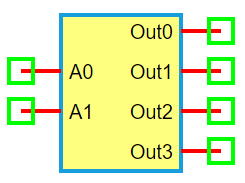2-to-4 Decoder
Information

A 2-to-4 Decoder is a digital circuit that decodes a 2-bit binary input into one of four outputs. Only one output is high (logic ‘1’) at a time, depending on the input combination. It is often used in address decoding and memory selection logic.
Truth Table
Ports
A0, A1: Binary address inputs
Out0 to Out3: Four output lines (only one is high at a time)
Model
The Decoder2to4 model implements a basic 2-bit input to 4-output binary decoder.
Attributes:
A0, A1 (dsignal): Input address lines
Out0–Out3 (dsignal): Four decoder output lines
Methods:
digital(): Activates one output line based on the binary address inputs
from pyams.lib import dsignal, model
class Decoder2to4(model):
""" 2-to-4 Binary Decoder """
def __init__(self, A0, A1, Out0, Out1, Out2, Out3):
self.A0 = dsignal(direction='in', port=A0)
self.A1 = dsignal(direction='in', port=A1)
self.Out0 = dsignal(direction='out', port=Out0)
self.Out1 = dsignal(direction='out', port=Out1)
self.Out2 = dsignal(direction='out', port=Out2)
self.Out3 = dsignal(direction='out', port=Out3)
def digital(self):
""" Perform decoding """
a0 = self.A0
a1 = self.A1
self.Out0 += ~a1 & ~a0
self.Out1 += ~a1 & a0
self.Out2 += a1 & ~a0
self.Out3 += a1 & a0
Command syntax
The syntax for defining a 2-to-4 decoder in a PyAMS simulation:
# Import the model
from pyams.models import Decoder2to4
# DEC: instance name
# A0, A1: address inputs; Out0–Out3: output lines
DEC = Decoder2to4(A0, A1, Out0, Out1, Out2, Out3)